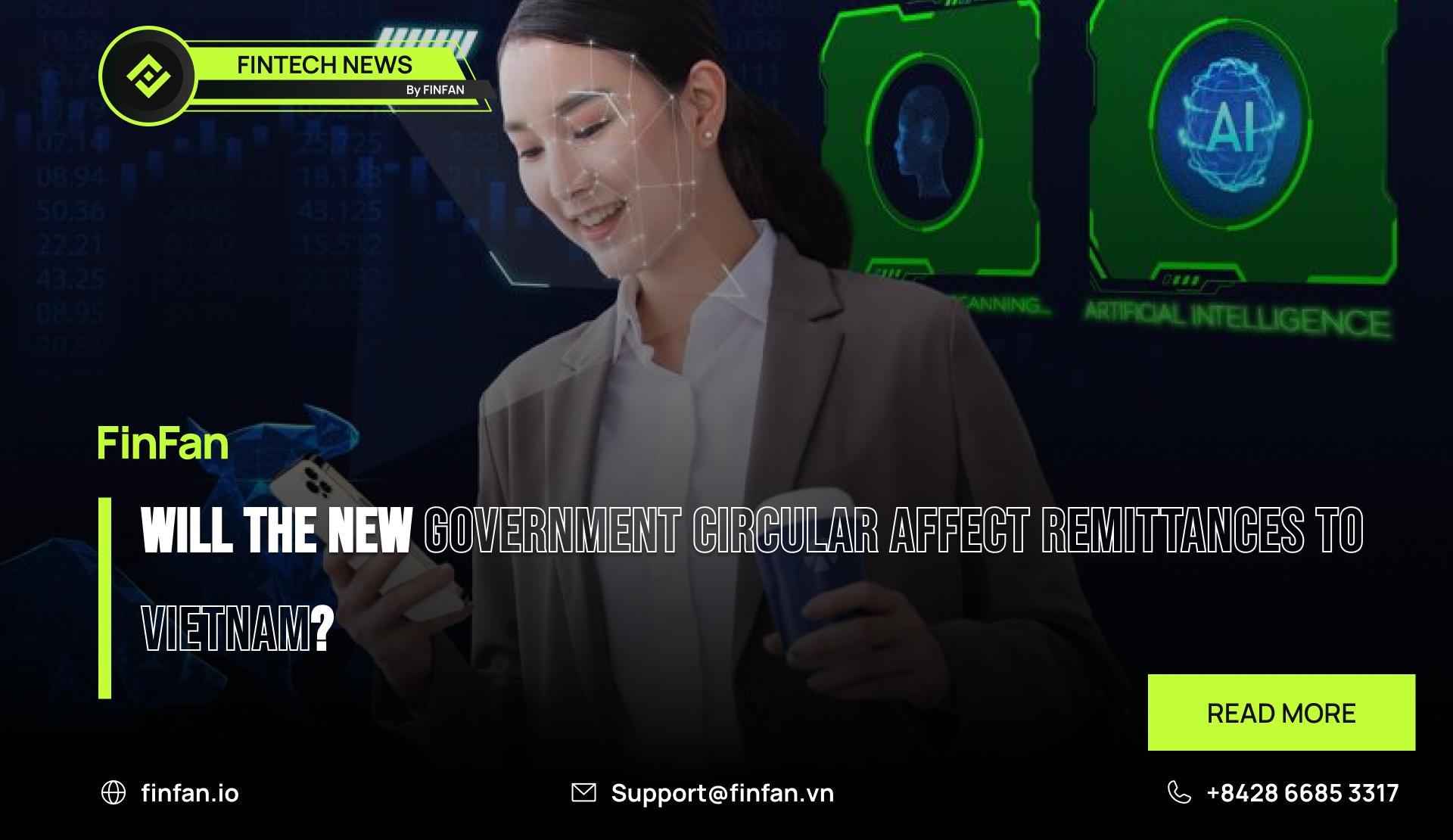Will the New Government Circular Affect Remittances to Vietnam?

From July 1st, the State Bank of Vietnam (SBV) began implementing safety and security measures for online payments and bank card transactions in accordance with Decision 2345/QD-NHNN.
Millions of Vietnamese citizens have started to engage in new facial and identity verification procedures to receive and transfer amounts exceeding 10 million VND through their accounts.
Additionally, the Vietnamese Government has recently issued Decree No. 52/2024/ND-CP, which introduces new regulations on cashless payments to more strictly manage intermediary payment service providers in Vietnam.
These decisions demonstrate the Vietnamese Government's determination to more tightly regulate cashless payment solutions in Vietnam. How does this affect remittances to Vietnam? Let's explore this further in the following article by FinFan.
Overview of the New Government Circular
The recent circular, issued by the State Bank of Vietnam (SBV), is designed to enhance the safety and security of online payments and bank card transactions. Key components of the regulation include:
- Enhanced Verification Procedures: From July 1st, all financial institutions must implement stricter facial and identity verification processes for transactions exceeding 10 million VND. This measure aims to reduce fraud and ensure the authenticity of high-value transactions.
- Tighter Control Over Intermediary Payment Services: The government has introduced Decree No. 52/2024/ND-CP, which sets forth new regulations for intermediary payment service providers. This includes more rigorous licensing requirements and operational oversight to ensure compliance with national security and anti-money laundering (AML) standards.
Why The Vietnamese Government has shown a Strong Interest in Implementing Identity Verification Processes for Transactions
The Vietnamese government has shown a strong interest in implementing identity verification processes for transactions for several key reasons:
1. Enhancing Financial Security
By requiring stringent identity verification, the government aims to protect the financial system from fraud and unauthorized transactions. This helps build trust among consumers and businesses in the integrity of the financial system.
2. Preventing Money Laundering and Terrorism Financing
Stricter identity verification processes are crucial in preventing money laundering and financing of terrorism. These measures help track and monitor large transactions, ensuring that funds are not being used for illicit activities.
3. Complying with International Standards
Vietnam is committed to aligning its financial regulations with international standards set by organizations such as the Financial Action Task Force (FATF). Implementing rigorous identity verification processes helps the country meet these global benchmarks, fostering international cooperation and trade.
4. Strengthening Regulatory Oversight
Enhanced identity verification allows the government to better monitor and regulate financial transactions. This increased oversight helps identify and address suspicious activities promptly, ensuring a more stable and secure financial environment.
5. Promoting Cashless Transactions
By ensuring the security of cashless transactions, the government encourages the adoption of digital payment methods. This move aligns with the broader goal of reducing the reliance on cash, increasing financial inclusion, and promoting economic efficiency.
6. Protecting Consumers
Implementing robust identity verification processes helps protect consumers from identity theft and other forms of financial fraud. This protection enhances consumer confidence in using digital payment methods, contributing to the growth of the cashless economy.
7. Economic Stability
A secure and transparent financial system is essential for maintaining economic stability. By preventing fraud and other financial crimes, the government ensures a stable environment for economic growth and development.
8. Encouraging Foreign Investment
A robust regulatory framework that includes stringent identity verification processes can attract foreign investors by providing a secure and transparent business environment. This can lead to increased foreign direct investment (FDI), which is beneficial for the country’s economic growth.
Advantages and Disadvantages of Remittances to Vietnam Under the New Government Circular
Advantages of Remittance to Vietnam
Enhanced Security and Fraud Prevention
The new identity verification processes help prevent fraudulent activities and unauthorized transactions, ensuring that remittances reach their intended recipients safely.
This increased security can build trust among users and encourage the use of formal remittance to Vietnam channels.
Compliance with International Standards
By aligning with international anti-money laundering (AML) and counter-terrorism financing (CTF) standards, Vietnam enhances its reputation in the global financial community.
This compliance can facilitate smoother and more reliable remittance flows from abroad.
Improved Regulatory Oversight
Advantage: The stricter regulations enable better monitoring and control of remittance to Vietnam flows, helping the government identify and address any suspicious activities promptly. This oversight can contribute to a more stable and transparent financial system.
Promotion of Formal Remittance to Vietnam Channels like FinFan and Our International and Domestic Partners
The regulations encourage the use of formal remittance to Vietnam channels by reducing the appeal of informal methods.
This shift can lead to more accurate tracking of remittance volumes and better integration into the official financial system.
Consumer Protection
The enhanced verification processes protect consumers from identity theft and other financial frauds, ensuring that their funds are secure. This protection can increase consumer confidence in digital remittance services.
Disadvantages of Remittance to Vietnam
Delays in Transaction Processing
The additional verification steps could slow down the processing of remittances, particularly for larger transactions.
Delays can be problematic for recipients who rely on timely remittance inflows for their daily needs.
Reduced Accessibility
Stricter identification requirements might pose challenges for individuals who lack the necessary documentation and knowledge about the new technology of identity verification, such as some workers or farmers.
Potential Reduction in Remittance Volumes
Processing delays and accessibility reductions could discourage senders from remitting large sums, potentially leading to a reduction in overall remittance volumes. This decline could negatively impact households that depend on these funds.
Conclusion Regarding the New Government Circular Affects Remittances to Vietnam
The new government circular marks a significant step towards enhancing the security and regulation of financial transactions in Vietnam.
While it presents challenges for the remittance landscape, with proactive measures and effective stakeholder collaboration, these can be managed.
Ensuring a secure and efficient remittance system is crucial for maintaining the vital flow of funds that support millions of Vietnamese families and contribute to the country's economic stability.
What customers need to do when sending remittances to Vietnam is to choose reputable and legitimate entities to ensure the safety and legality of the funds sent back to Vietnam. The services of FinFan's international remittance partners will greatly support this effort.
Read more:
. Remitly Cooperates with Finfan - Money Real Time on The Go
. How To Send Money from The United States to Vietnam by Using Finfan’s Partner – Sendwave
. Ria - Finfan: For Faster, Cheaper and Easier Money Transfer
This article was curated and authored by FinFan's market research and development team, alongside our marketing department.
About FinFan
FinFan is a cross-border embedded financial services company that focuses on mass disbursement, fund collection, card processing, IBAN, and digital APMs solutions, which can provide valuable input and integration on and for the same.
FinFan is already integrated with almost the world's well-known MTOs, PSPs, switch, and core fintech platforms such as Money Gram, Thunes, Qiwi, Remitly, World Remit, Bancore, PaySend, Terrapay, Ria Money Transfer (Euronet), Dlocal, Ripple, TripleA, FoMo Pay, Wings, etc.
For more information, please get in touch with us through:
🌐https://finfan.io
📞(+84) 2866 85 3317
✉ support@finfan.vn
LinkedIn: FinFan





